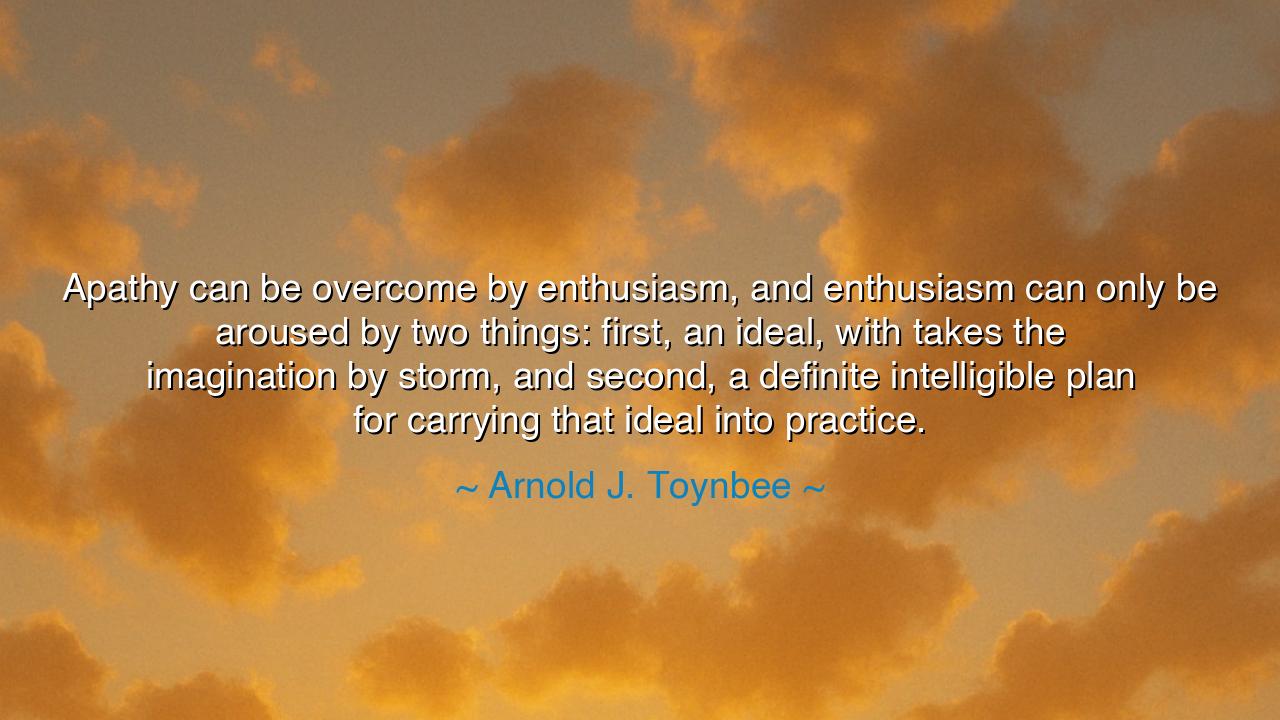
Apathy can be overcome by enthusiasm, and enthusiasm can only be
Apathy can be overcome by enthusiasm, and enthusiasm can only be aroused by two things: first, an ideal, with takes the imagination by storm, and second, a definite intelligible plan for carrying that ideal into practice.






“Apathy can be overcome by enthusiasm, and enthusiasm can only be aroused by two things: first, an ideal, which takes the imagination by storm, and second, a definite intelligible plan for carrying that ideal into practice.” Thus spoke Arnold J. Toynbee, the historian and philosopher of civilizations, who spent his life studying the rise and fall of empires and the fate of the human spirit within them. In these words, he gives voice to one of the most timeless truths of human endeavor—that the decay of societies and souls alike begins not with defeat, but with apathy; and that the force which revives them is enthusiasm, the divine fire of purpose awakened by imagination and directed by reason.
Toynbee wrote from the vantage point of history’s long arc. He observed that great civilizations do not perish from external conquest alone—they die when they lose faith in their ideals, when their people cease to dream and cease to act. In his monumental work, A Study of History, he examined the cycles of human culture, finding that decline always followed a failure of vision. Apathy, he saw, is a sickness of the spirit, a weariness that comes when men and women no longer see meaning in their struggle. It can only be cured by enthusiasm, that sacred energy which unites heart, mind, and will. Yet, as Toynbee warns, enthusiasm does not arise by accident—it must be born of two sacred parents: the ideal that captures the imagination, and the plan that gives that ideal form.
An ideal is the spark that sets the imagination aflame—it is the dream of what could be, the vision that lifts the human gaze beyond the horizon of the ordinary. Without such ideals, humanity sinks into comfort and complacency; with them, it becomes capable of miracles. The abolition of slavery, the birth of democracy, the exploration of space—each began as an ideal that “took the imagination by storm.” Yet, as Toynbee knew, an ideal without direction is but a passing flame. To transform passion into progress, the dream must be joined to a definite, intelligible plan, a structure through which imagination may enter the world and shape it. The dreamer without a plan drifts; the planner without a dream toils without meaning. It is the union of the two that gives rise to enthusiasm—that force which conquers despair and reshapes the course of history.
Consider the story of Mahatma Gandhi, who lived this truth in the flesh. His ideal was simple yet boundless: freedom for India through nonviolence, the victory of the soul over the sword. This ideal seized the imagination of millions, for it offered not only political liberation but spiritual awakening. Yet Gandhi’s greatness lay not only in his vision but in his plan—his clear, disciplined method of resistance through satyagraha, fasting, and peaceful protest. The combination of these two forces—vision and method—transformed apathy into purpose, and despair into enthusiasm. It was not merely the cry for freedom that changed the world, but the organized march toward it. Thus, Gandhi embodied Toynbee’s law: that imagination without structure is chaos, but when channeled through will and wisdom, it becomes creation itself.
In this, Toynbee speaks not only of nations but of every soul. For each person carries within them both the capacity for apathy and for enthusiasm. When life loses meaning, when the heart grows weary of repetition, it is because the imagination has grown dim, and the will has lost direction. To revive it, one must first rediscover an ideal—something worth living and laboring for, something larger than the self. Then, one must make a plan, however humble, to bring that vision into being. Every artist, every reformer, every hero of history has walked this path: to dream greatly, and then to act deliberately. It is not enough to yearn; one must build.
O children of the future, take this lesson to heart: the age of apathy is always near. It waits for those who cease to imagine, who surrender their dreams to cynicism. But even the darkest age can be rekindled by a single soul ablaze with enthusiasm. Seek your ideal—not in comfort, but in courage; not in vanity, but in virtue. Let it seize your imagination until it shakes your sleep and demands your action. Then, with patience and clarity, make your plan—each step a prayer, each effort a promise. For the marriage of vision and discipline births greatness.
Therefore, let this be your guiding wisdom: overcome apathy with enthusiasm. Do not wait for the world to inspire you—create your own fire. Let your imagination see what others cannot, and let your reason craft the road to reach it. For in this union lies the secret of all achievement—the alchemy by which dreams become destiny, and the soul transforms despair into creation. As Toynbee teaches, civilization itself depends on this sacred balance. Without the ideal, we do not dream; without the plan, we do not act. But when both dwell within us, the human spirit becomes unstoppable, and even the deadest age awakens once more to light.






AAdministratorAdministrator
Welcome, honored guests. Please leave a comment, we will respond soon